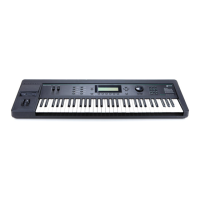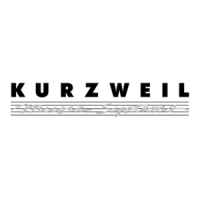Program Mode and the Program Editor
The Program Editor—Pages
6-14
The KEYMAP Page
Press the KEYMAP soft button to call up the KEYMAP page. The parameters on this page affect
sample root selectionÑwhich samples are played on which keys.
EditProg:KEYMAP||||||||||||<>Layer:1/1||
||||||||||||||||||||||||||||||||||||||||
KeyMap:1|Grand|Piano|||||||||Stereo:Off|
Xpose|:0ST||||||||TimbreShift|:0ST||||||
KeyTrk:100ct/key||AltSwitch|||:OFF||||||
VelTrk:0ct||||||||PlayBackMode:Normal|||
||||||||||||||||||||||||||||||||||||||||
<more||ALG||||LAYER||KEYMAP|PITCH||more>
PARAMETER RANGE OF VALUES DEFAULT
KEYMAP Keymap list 1 Grand Piano
TRANSPOSE ± 60 semitones 0
KEY TRACKING ± 2400 cents per key 100
VELOCITY TRACKING ± 7200 cents per key 0
STEREO Off, On Off
TIMBRE SHIFT ± 60 semitones 0
ALT SWITCH Control Source list OFF
PLAYBACK MODE Norm, Rvrs, Bidirectional, Noise Normal
Keymap
Assign a ROM or RAM keymap to the current layer. Keymaps are collections of samples
assigned to note and velocity ranges. There are nearly 200 ROM keymaps to choose from. YouÕll
Þnd a list of them in the Reference Guide.
Transpose (Xpose)
Transpose the current keymap up or down as much as 60 semitones (5 octaves).
Key Tracking (KeyTrk)
This is one of the six common DSP control parameters. On the KEYMAP page, key tracking
affects the interval between notes. The default value of 100 cents (hundredths of a semitone)
gives you the normal semitone interval between each note. Higher values increase the interval;
lower values decrease it. Negative values will cause the pitch to decrease as you play higher
notes. You can create a mirror-image piano by setting the key tracking to Ð100 and transposing
the layer up 4 semitones. When you make changes to this parameter, youÕll need to keep in
mind that KeyTrk on the KEYMAP page works in conjunction with KeyTrk on the PITCH page.
Therefore, youÕll need to check the KeyTrk value on both pages to see how key tracking works
within a program.
Velocity Tracking (VelTrk)
This is another common DSP control parameter. As with the other parameters on the KEYMAP
page, this shifts the position of the keymap. Different attack velocities will play different pitch
shifts of the sample root assigned to that note range. If the shift is great enough, the next higher
or lower sample root will be played, which in some cases (like the drum programs) will play an
entirely different sound. Positive values will play higher pitches of the sample root when you
use hard attack velocities (they shift the keymap downward), while negative values will play
lower pitches.

